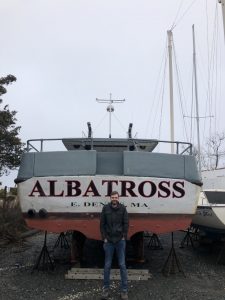
By Colorado Review Associate Editor Evan Senie
At four o’clock in the morning I finally left my bed, worried that my tossing and turning was keeping my girlfriend up. I took a blanket and my computer, went downstairs, and sat on the couch. I opened my laptop and pulled up the tab I’ve had open for two weeks now. It’s a website that updates every minute with total COVID-19 cases around the world. They’re broken down by country, region, and state. Today’s new cases have their own column. There’s another for serious cases, another for total deaths. Numbers and data are the lens through which I’m most comfortable looking at the world, but even for me the site is overwhelming. I don’t know how to process that amount of suffering.
My girlfriend and I have spent almost all of our time recently in my tiny apartment. Almost every day she goes on a long run. I’ve started running too, just a couple miles around City Park, panting and doubled over by the end. We take walks, too. Around the neighborhood, to the store, where we bring Clorox wipes and make sure to leave no trace of our skin, of whatever we might be carrying, on any surfaces. Inside and outside have fractured, become separate worlds, one intimate and the other careful, measured. There are exceptions. On my run yesterday it was sunny and warm. There were lots of people in the park. I watched couples walk together, passed a middle-aged man swinging by himself in an empty playground. I ran past an elderly lady, limping along the path, and she smiled at me, said that now we all have to get our exercise, even her. At the grocery store I watched people thank the young man unloading boxes, listened as he told them to have a nice day.
I thought about writing a blog post arguing that in times like these, perhaps more than any other, we need art, need creative writing. That’s probably true. But it’s not like we need writing in a way that we don’t need other things. FaceTime calls with friends and family, Netflix, good recipes for all the canned food in the pantry. People are making decisions they’ve never had to make before, dealing with circumstances that are new and scary. It seems like forever ago, but it’s really been just a few weeks: I watched our editor in chief, Stephanie G’Schwind, handle the decision about whether to go to AWP with grace, compassion, and patience. Most of all, she handled it with empathy. She left space for people to deal with the situation however it made sense to them; she was supportive and composed. People everywhere are having to decide how to make a living, having to weigh benefits and costs without sufficient information. Colorado Review is doing this too. We can no longer bring our staff into the office. We’ve temporarily lost the physical space in which we create our own little community. But we’re still reading, still poring over pages looking for writing that breathes and lives, that finds beauty, even if that beauty exists in the sharing of hardship. Writing doesn’t give us something exclusive, but good writing is about exploration, about honoring the uniqueness of lived experience, about empathy.
As I sat there, huddled on the couch, refreshing the statistics, I thought about exponential growth, about hospital shortages. I looked at each state, each country, tried to bend the numbers into the future, tried to see what was in store. I had thought maybe I’d spend the rest of the night down there, alone, not being a bother. In the end I found that I couldn’t do it, didn’t want to, and I shut my computer, went back upstairs, climbed into bed next to my girlfriend, and finally, at some point, slept.
